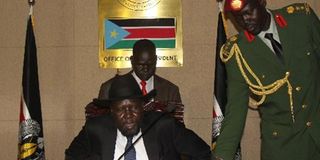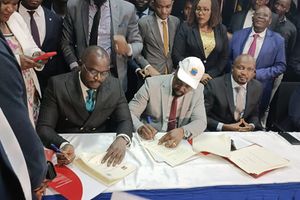South Sudan leader arrives to attend talks on deadline day

South Sudan's President Salva Kiir takes his seat at the State House, in Juba, prior to a brief consultative meeting with cabinet and State Governors, on August 16, 2015. PHOTO | WAAKHE SIMON WUDU |
What you need to know:
- We expect the parties to be represented in Addis Ababa by their principals, says Igad.
- Rebels and government are under intense diplomatic pressure to sign a deal to end a 20-month civil war in which tens of thousands of people have been killed.
JUBA
South Sudanese President Salva Kiir arrived in Ethiopia on Sunday for peace talks aimed at brokering an end to civil war, reversing an earlier decision as international threats of possible sanctions mount.
But Mr Kiir, who said he had been “compelled” to join the talks alongside rebel leaders and regional presidents, warned it would not be possible to sign a lasting or full peace deal until all opposition factions could join the agreement.
“A peace that cannot be sustained cannot be signed,” Mr Kiir said, before leaving Juba.
“You should sign something that you will enjoy. If it is signed today and then tomorrow we go back to war, then what have we achieved?”
South Sudan’s government and rebels are under intense diplomatic pressure to sign a deal by August 17 to end a 20-month civil war in which tens of thousands of people have been killed.
Mr Kiir previously said he would send his deputy after complaining it was not possible to strike an effective deal because rebel forces have split.
'NEGATIVE FORCES'
But on Sunday he decided to go himself after consultations with regional leaders, who have already arrived in Addis Ababa for the summit meeting on Monday.
“Even if I am not happy, I must show my face because if I don’t go, negative forces will take me as the one against the peace that was going to be signed,” Kiir added.
South Sudan’s civil war began in December 2013 when Kiir accused his former deputy Riek Machar of planning a coup, setting off a cycle of retaliatory killings that has split the poverty-stricken, landlocked country along ethnic lines.
On Tuesday, rebel generals said they had split from Machar. The latest round of talks opened on August 6, mediated by the regional eight-nation bloc Igad, the Intergovernmental Authority on
Development, as well as the United Nations, African Union, China and the “troika” of Britain, Norway and the United States.
Diplomats have warned any failure to sign a peace deal could trigger “serious consequences” for the rival leaders, but South Sudan’s Cabinet Minister Elia Lomuro said such threats were not helpful.
“We are not afraid of sanctions, this country belongs to us, the peace that we are talking belongs to us not to them,” Lomuro said.
Britain’s minister for Africa, Grant Shapps, warned on Friday of possible “targeted sanctions” and an arms embargo if no deal is made.
Marked by widespread atrocities on both sides, the war has been characterised by ethnic massacres and rape. Recent attacks have included castration, burning people alive and tying children together before slitting their throats.
More than 70 per cent of the country’s 12 million people need aid, while 2.2 million people have fled their homes, the UN says, with areas on the brink of famine.





